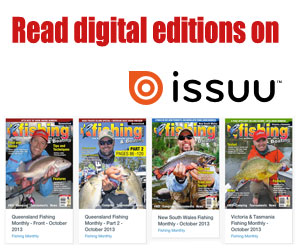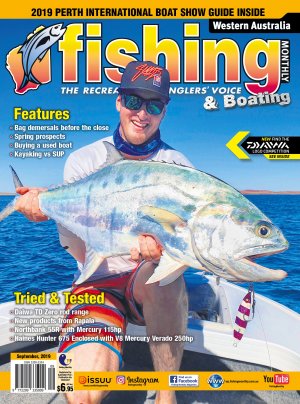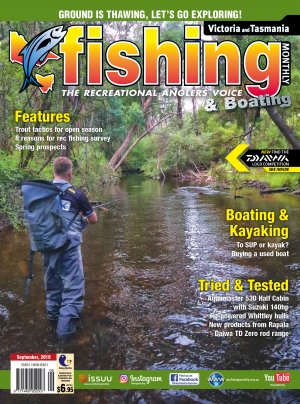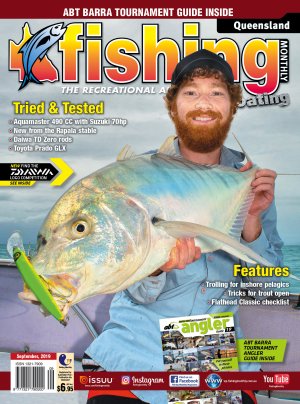St Georges Basin, just south of Jervis bay, was made a recreational fishing haven in 2002 when commercial fishing licences from 24 locations across NSW were purchased using funds from the recreational fishing licence.
‘The Basin’ was one of the first in the historical buy-back scheme and the quality of fishing that I experienced there early last year will make my next rec licence purchase a pleasure. Knowing that your money is actually going towards improving fishing makes a huge difference.
Greg Reid of Bay and Basin Sports Fishing picked us up from Paperbark Camp and we were on the water by 7am.
Our first stop was a mid-lake drop-off, detectable only by sounder and local knowledge. The conditions were postcard-perfect and within an hour we had half a dozen flathead, including one approaching 3kg, a couple of legal reddies, a few bream and a couple of tailor.
Given that this was all done with lures and that most of our crew were borderline non-fishers requiring instruction time, this was a very impressive result.
Then we moved to the eastern side of the lake to have a shot at a big flattie. As we arrived, Greg recognised a couple of old regulars so we went over for a chat. Old mates had bulging keeper nets over both sides of the boat and it was at this point that I realised the true potential of rec havens and the looming need to reassess bag or boat limits.
Their keepers were crammed with a mix of flatties, bream, flounder, reddies and trevally the likes of which have not been achievable inside of the past 40 years.
While I’m not suggesting for one minute that they had broken any laws, and Greg assured me that the fish would not go to waste, I couldn’t help wondering if this was best-practice use of our newly-replenished resource.
Should the focus for rec havens be on sport or food? In defence of recreational food harvesting, there is no doubt that a feed taken in this manner has considerably less environmental impact (in this case, by-catch) than the same fish taken with commercial methods.
I have no objection to rec fishos taking home a couple of feeds. In the past, no one has been overly concerned by the fact that many of our bag limits are set too high, mainly because they have been largely unachievable.
This situation is rapidly changing, mainly in some rec havens. Maybe we are due for revised bag limits exclusive to rec havens? It’s been done in the Northern Territory.
We worked the eastern bank for numerous flatties before deciding to have a shot at whiting over the flats.
This was something new to me and I was surprised at the speed of the retrieve. We used poppers and worked them at a speed normally reserved for the likes of tailor. It worked, and we nailed a couple of nice whiting and a big bream.
Greg wanted to show us the bream fishing in the estuary so with time running out, we bolted to some of the feeder creeks on the western shore. In line with the rest of the day, the fishing was spectacular and we took numerous bream on divers, plastics and poppers before heading back to the ramp.
All up, the trip was a real eye-opener and testimony to what can be achieved with some smart management. In addition to what we caught, Greg tells me that they get quality jewies, big tailor and a few bass and estuary perch in one of the feeder creeks.
Throw in a healthy population of mud crabs in the Summer, excellent service and facilities and the fact that its only three hours’ drive from Sydney and we could just be witnessing the birth of the future of recreational fishing in this country.
The trip inspired a plethora of thoughts about the implications on the future of fishing as a result of the creation of recreational havens. What are our responsibilities as the custodians of these new zones and how can we ensure that we don’t lose them to politics or vocal minority groups?
What will be the economic impacts?
What are reasonable expectations on the quality of fishing from these areas into the future?
One of the greatest obstacles to fisheries management worldwide is the lack of baseline studies. In other words, it’s very hard to assess the state of a fish stock without knowing the original biomass.
Unfortunately, there was very little interest in fisheries research until such point that we became aware of serious decline, at which time the opportunity to conduct a baseline study had passed.
While some effort is being made to establish baselines for selected species using historical log records, scant information on distribution, effort, technology and climatic conditions of the times incur limitations that, at best, will only ever show us part of the picture.
Despite what some green extremists might have us believe, to expect fish stocks to return to levels experienced before human exploitation is unrealistic and ignores the fact that humans are entitled to exist and are part of the ‘system’.
So what is a reasonable expectation for us on fisheries management? I think overall sustainability should be our key aim, with a strong emphasis on accountability of by-catch.
This ensures a steady, measured supply of seafood – indefinitely.
Our current system of overexploiting stocks and then scrambling for radical and extreme solutions is clearly not working.
This system usually results in overexploited, endangered and, in worst case, extinction of species.
It also ensures unreliable market supply, stressed fisheries management and redundant commercial fleets, not to mention negative impacts on the recreational sector.
What is reasonable for us to expect on a personal individual level as an angler? It’s an interesting question and one that must take into consideration the fact that from a Darwinian perspective, all hunters were not created equal.
I recall chatting to an old-timer about the ‘good old days’ before overexploitation and was interested to hear that despite abundant, uneducated fish, there were nevertheless greatly varying success rates among anglers. He did, however, point out that even the least competent could generally ‘always get a feed’ and I feel that this should be the benchmark for minimum expectations from individuals.
While it’s all very well to place our expectations on fisheries management, what responsibilities do we, as individuals, carry?
From the boom-and-bust nature of resources throughout most of human existence evolved an unpleasant condition known as greed. It’s only become a dirty word in the past few hundred years and its sanitised version, ‘make hay while the sun shines’ was an entirely sensible and necessary catchcry for humanity’s survival.
There’s no question that commercial fishing has been responsible for the entire major fisheries decline but the psyche of the commercial fisher that led to the carnage is close to all our hearts.
Sport fishing patriarch Vic McCristal once wrote of rec anglers that ‘the only reason we want to see improvements in fish stocks is so that we can kill them again’.
We have been guilty of a few piscatorial atrocities of our own and despite having had little bearing on overall stocks, they were nevertheless unacceptable in principle.
While NSW Fisheries size and bag limits have been imposed on us, I would like to think that they are only necessary as a control on those in our ranks with the least self-control.
As a show of goodwill and a good demonstration of our ability to self-regulate, I think it would be a huge step forward to for us to set personal bag limits somewhere below official regulations.
The Fisheries bag limit for 20 bream is a maximum, not a recommendation. It’s a sad fact that the only reason a percentage of our fraternity does not indulge the recreational bloodlusts of the past is because there aren’t enough fish left to do so.
Due to some very good fisheries management in recent years, the time is fast looming when current bag limits will be readily achievable in some places.
One of the issues shortly to cloud the horizon of fisheries management is the jumble of conservation/enhancement programs currently in play.
How will we determine which of the multitude of measures, or combinations thereof, were responsible for the improvement of the resource?
Was it the Clean Waterways program, rec bag limits, marine parks, commercial buybacks, stocking programs, artificial reefs or habitat restoration?
Already I’ve seen dangerous sentiment alluding to improvements in a commercial buy-back zone being attributed to nearby marine parks.
We are going to have to be very careful to keep perspective on this issue or be prepared for a cry of green pseudo-victory.
We need to be vigilant in ensuring that everyone is aware that rec havens have shown such a remarkable comeback are the result of the removal of commercial fishing, first and foremost.
Facts
FISHING BOOM TOWNS
Considerable economic impact is just around the corner for coastal towns adjacent to substantial rec havens.
Do you remember the old signs as you drove up the Pacific Highway declaring the town you were just entering was a ‘fisherman’s heaven’? The goofy angler caricature held up a generic cartoon fish while his bikini-clad wife played with the kids on the beach in the background.
Even then canny tourism people knew the major influences on choice of destinations for families. The statistics showed that fishing was a major consideration for up to 70% of tourists surveyed. The outdated signs remained long after the fishing crashed.
With rec havens now starting to show their true potential, the gap between the piscatorial haves and have-nots will widen dramatically.
Within the next decade we will see the re-emergence of some true ‘fisherman’s heavens’ and those towns adjacent to fishing wastelands will find themselves on the list of tourist ‘cold spots’. With country Australia increasingly relying on tourism, this could have serious economic impacts.
I feel that we are witnessing a major turning point and a glimpse of future fisheries management. Let’s ensure that we don’t mess it up.

It’s a special waterway where snapper of this size, and a lot bigger, can be caught in broad daylight by a rec fisher with average skills.
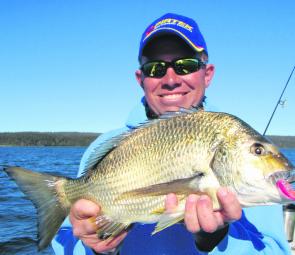
While not as old as a black bream of similar size, yellowfin bream are now free to grow larger, thanks to a growing catch-and-release ethic and the removal of commercial netting from St Georges Basin. Bream of this size can be caught and released many tim
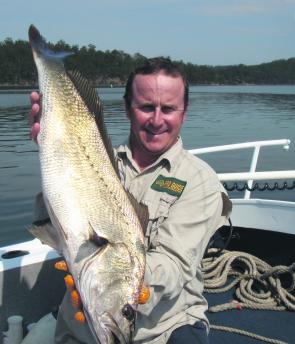
Mulloway of all sizes have no nets to avoid in rec fishing havens. A fish this size is only just sexually mature. Despite being listed as overfished, commercial fishers are free to land tonnes of mulloway from only a tragic 45cm long.

There’s nowhere in NSW where there are now more ‘croc’-sized female flathead than in St Georges Basin.
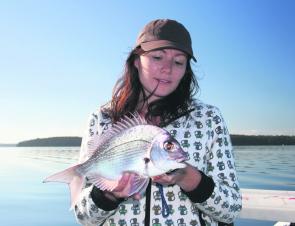
Legal-sized snapper are now common in the recreational fishing haven of St Georges Basin.
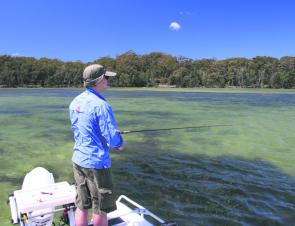
Extensive seagrass beds are no longer pockmarked and torn up by netters, encouraging further plant growth in these rich fish nurseries.
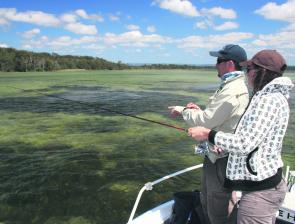

Surface luring for bream on a net-free waterway – it’s estuary fishing nirvana!
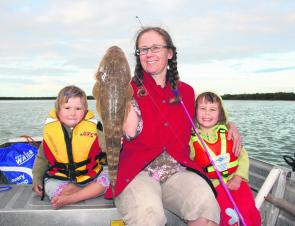
Properly managed recreational fishing havens can secure the future of recreational fishing – and the economic future of nearby towns – for generations to come.

